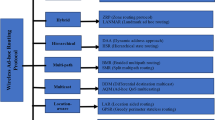Abstract
We propose an innovative resource management scheme for TDMA based mobile ad hoc networks. Since communications between some important nodes in the network are more critical, they should be accepted by the network with high priority in terms of network resource usage and quality of service (QoS) support. In this scheme, we design a location-aware bandwidth pre-reservation mechanism, which takes advantage of each mobile node’s geographic location information to pre-reserve bandwidth for such high priority connections and thus greatly reduces potential scheduling conflicts for transmissions. In addition, an end-to-end bandwidth calculation and reservation algorithm is proposed to make use of the pre-reserved bandwidth. In this way, time slot collisions among different connections and in adjacent wireless links along a connection can be reduced so that more high priority connections can be accepted into the network without seriously hurting admissions of other connections. The salient feature of our scheme is the collaboration between the routing and MAC layer that results in the more efficient spatial reuse of limited resources, which demonstrates how cross-layer design leads to better performance in QoS support. Extensive simulations show that our scheme can successfully provide better communication quality to important nodes at a relatively low price. Finally, several design issues and future work are discussed.
Similar content being viewed by others
References
A. Veres, A.T. Campbell, M. Barry and L.H. Sun, Supporting service differentiation in wireless packet networks using distributed control, IEEE Journal on Selected Areas in Communications (Oct. 2001) 2094–2104.
G.S. Ahn, A.T. Campbell, A. Veres and L.H. Sun, SWAN: service differentiation in stateless wireless ad hoc networks, in: Proceedings of IEEE INFOCOM (June 2002).
V. Kanodia, C. Li, A. Sabharwal, B. Sadeghi and E. Knightly, Distributed Multi-hop scheduling and medium access with delay and throughput constraints, in: Proceedings of ACM MOBICOM (July 2001).
I. Chlamtac, A. Farago and H. Zhang, Time-spread multiple-access (TSMA) protocols for multihop mobile radio networks, IEEE/ACM Transactions on Networking (Oct. 1997) 804–812.
A.M. Chou and V.O.K. Li, Slot allocation strategies for TDMA protocols in multihop packet radio networks, in: Proceedings of IEEE INFOCOM (May 1992).
P. Bjorklund, P. Varbrand and D. Yuan, Resource optimization of spatial TDMA in ad hoc radio networks: a column generation approach, in: Proceedings of IEEE INFOCOM (March–April 2003).
C.R. Lin and J.-S. Liu, QoS routing in ad hoc wireless networks, IEEE Journal on Selected Areas in Communications (Aug. 1999) 1426–1438.
C.R. Lin, Admission control in time-slotted mulithop mobile networks, IEEE Journal on Selected Areas in Communications (Oct. 2001) 1974–1983.
C. Zhu and M.S. Corson, QoS routing for mobile ad hoc networks, in: Proceedings of IEEE INFOCOM (June 2002).
W.H. Liao, Y.C. Tseng, S.L. Wang and J.P. Sheu, A multi-path QoS routing protocol in a wireless mobile ad hoc network, in: Proceedings of IEEE ICN (July 2001).
Z. Ye, S.V. Krishnamurthy and S.K. Tripathi, A framework for reliable routing in mobile ad hoc networks, in: Proceedings of IEEE INFOCOM (March–April 2003).
Y. Ko and N. Vaidya, Location-aided routing (LAR) in mobile ad hoc networks, in: Proceedings of ACM MobiCom (Oct. 1998).
R. Banka and G. Xue, Angle routing protocol: location aided routing for mobile ad-hoc networks using dynamic angle selection, in: Proceedings of IEEE MILCOM (Oct. 2002).
B. Karp and H. Kung, GPSR: Greedy perimeter stateless routing for wireless networks, in: Proceedings of ACM MobiCom (Aug. 2000).
USCG Navigation Center GPS page, http://www.navcen.uscg.gov/gps/default.htm, May 2003.
B.W. Parkinson and S.W. Gilbert, NAVSTAR: global positioning system—ten years later, Proceedings of the IEEE (1983) 1177–1186.
J. Li, J. Jannotti, D. DeCouto, D. Karger and R. Morris, A scalable location service for geographic ad hoc routing, in: Proceedings of ACM MobiCom (Aug. 2000).
D. Hong and S.S. Rappaport, Traffic model and performance analysis for cellular mobile radio telephone systems with prioritized and nonprioritized handoff procedures, IEEE Transactions on Vehicular Technology (Aug. 1986) 77–92.
S. Chen and K. Nahrstedt, Distributed quality-of-service routing in ad hoc networks, IEEE Journal on Selected Areas in Communications (Aug. 1999) 1488–1505.
S. Nesargi and R. Prakash, Distributed wireless channel allocation in networks with mobile base stations, IEEE Transactions on Vehicular Technology (Nov. 2002) 1407-1421.
W.H. Liao, Y.C. Tseng and K.P. Shih, A TDMA-based bandwidth reservation protocol for QoS routing in a wireless mobile ad hoc network, in: Proceedings of IEEE ICC (April–May 2002).
I. Ada and C. Castelluccia, Differentiation mechanisms for IEEE 802.11, in: Proceedings of IEEE INFOCOM (April 2001).
J. Yoon, M. Liu and B. Noble, Sound mobility models, in: Proceedings of ACM MobiCom (Sept. 2003).
S. Basagni, I. Chlamtac, V. Syrotiuk and B. Woodward, A distance routing effect algorithm for mobility (DREAM), in: Proceedings of ACM MobiCom (Oct. 1998).
D. Johnson, D. Maltz and J. Broch, DSR: The Dynamic Source Routing Protocol for Multi-Hop Wireless Ad Hoc Networks, in Ad Hoc Networking, edited by Charles E. Perkins, Chapter 5, pp. 139–172, Addison-Wesley 2001.
Author information
Authors and Affiliations
Corresponding author
Additional information
Xiang Chen received the B.E. and M.E. degrees in electrical engineering from Shanghai Jiao Tong University, Shanghai, China, in 1997 and 2000, respectively. Afterwards, he worked as a MTS (member of technical staff) in Bell Laboratories, Beijing, China. He is currently working toward the Ph.D. degree in the department of Electrical and Computer Engineering at the University of Florida. His research is focused on protocol design and performance evaluation in wireless networks, including cellular networks, wireless LANs, and mobile ad hoc networks. He is a member of Tau Beta Pi and a student member of IEEE.
Wei Liu received the BE and ME degrees in electrical engineering from Huazhong University of Science and Technology, Wuhan, China, in 1998 and 2001, respectively. He is currently pursuing the P.hD. degree in the Department of Electrical and Computer Engineering, University of Florida, Gainesville, where he is a research assistant in the Wireless Networks Laboratory (WINET). His research interest includes QoS, secure and power efficient routing, and MAC protocols in mobile ad hoc networks and sensor networks. He is a student member of the IEEE.
Hongqiang Zhai received the B.E. and M.E. degrees in electrical engineering from Tsinghua University, Beijing, China, in July 1999 and January 2002 respectively. He worked as a research intern in Bell Labs Research China from June 2001 to December 2001, and in Microsoft Research Asia from January 2002 to July 2002. Currently he is pursuing the Ph.D. degree in the Department of Electrical and Computer Engineering, University of Florida. He is a student member of IEEE.
Yuguang Fang received a Ph.D. degree in Systems and Control Engineering from Case Western Reserve University in January 1994, and a Ph.D. degree in Electrical Engineering from Boston University in May 1997. From June 1997 to July 1998, he was a Visiting Assistant Professor in Department of Electrical Engineering at the University of Texas at Dallas. From July 1998 to May 2000, he was an Assistant Professor in the Department of Electrical and Computer Engineering at New Jersey Institute of Technology. In May 2000, he joined the Department of Electrical and Computer Engineering at University of Florida where he got the early promotion to Associate Professor with tenure in August 2003 and to Full Professor in August 2005. He has published over 180 papers in refereed professional journals and conferences. He received the National Science Foundation Faculty Early Career Award in 2001 and the Office of Naval Research Young Investigator Award in 2002. He is currently serving as an Editor for many journals including IEEE Transactions on Communications, IEEE Transactions on Wireless Communications, IEEETransactions on Mobile Computing, and ACM Wireless Networks. He is also actively participating in conference organization such as the Program Vice-Chair for IEEE INFOCOM’2005, Program Co-Chair for the Global Internet and Next Generation Networks Symposium in IEEE Globecom’2004 and the Program Vice Chair for 2000 IEEE Wireless Communications and Networking Conference (WCNC’2000).
Rights and permissions
About this article
Cite this article
Chen, X., Liu, W., Zhai, H. et al. Location-aware resource management in mobile ad hoc networks. Wireless Netw 12, 797–812 (2006). https://doi.org/10.1007/s11276-006-6056-x
Published:
Issue Date:
DOI: https://doi.org/10.1007/s11276-006-6056-x




